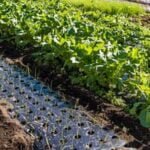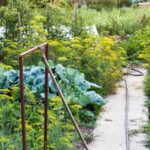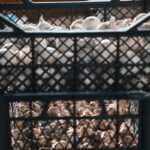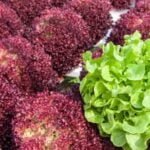Pine straw, also known as pine needle mulch, is a popular choice for gardeners looking to improve the health and yield of their vegetable gardens. Its benefits include natural weed and pest control, retention of soil moisture, and contribution of organic matter to the soil. Vegetable gardens are a common sight in many yards, providing a sustainable source of fresh produce for households. The combination of pine straw and vegetable gardens can result in thriving plants and bountiful harvests.
The use of pine straw as a mulch option for vegetable gardens has gained popularity due to its numerous advantages. When used properly, pine straw can enhance the growth and yields of various types of vegetables. It is important to understand which vegetables thrive with the use of pine straw and how to effectively apply it to maximize its benefits.
In this article, we will explore the benefits of using pine straw in vegetable gardens, such as natural weed and pest control, moisture retention in the soil, and organic matter contribution. We will also discuss the types of vegetables that thrive with pine straw, proper application techniques, comparison with other mulch options, potential drawbacks, and success stories from experienced gardeners who have reaped the rewards of using pine straw in their vegetable gardens.
Benefits of Using Pine Straw in Vegetable Gardens
Using pine straw in vegetable gardens holds several benefits for gardeners. One of the most significant advantages is that it acts as a natural weed and pest control. The natural acidity of pine straw deters the growth of weeds, reducing the need for chemical herbicides. Additionally, the sharp texture of pine needles can help deter slugs and snails, which are common pests in many vegetable gardens.
Moreover, pine straw is excellent for retaining soil moisture. By creating a protective layer over the soil, it helps reduce evaporation, allowing water to penetrate the ground more slowly and evenly. This is especially beneficial during hot summer months when water conservation is crucial for healthy plant growth.
In addition to its weed control and moisture retention properties, pine straw also contributes organic matter to the soil as it decomposes over time. This organic matter enriches the soil with valuable nutrients, promoting healthy root development and overall plant growth.
| Benefits | Details |
|---|---|
| Natural Weed and Pest Control | Pine straw’s natural acidity deters weed growth and helps repel certain pests. |
| Retention of Soil Moisture | Pine straw creates a protective layer over the soil, reducing evaporation and allowing for slower water penetration. |
| Organic Matter Contribution to the Soil | Pine straw decomposes over time, enriching the soil with nutrients for healthy plant growth. |
Types of Vegetables That Thrive With Pine Straw
Pine straw, also known as pine needles or pinestraw, is an excellent mulching material that can provide numerous benefits to vegetable gardens. This natural and sustainable resource not only helps in controlling weeds and pests but also aids in retaining soil moisture and contributes organic matter to the soil. When considering using pine straw for your vegetable garden, it is important to understand which types of vegetables can thrive with this type of mulch.
Here are some types of vegetables that benefit from the use of pine straw in their growth and yields:
- Tomatoes: Pine straw helps in maintaining the soil moisture levels required for healthy tomato plants. It also provides a natural barrier against pests and diseases that commonly affect tomatoes.
- Peppers: The retention of soil moisture provided by pine straw is particularly beneficial for pepper plants, helping them thrive and produce bountiful harvests.
- Squash: Pine straw acts as a protective layer for squash plants, preventing weeds from competing with them for nutrients and space. It also helps in keeping the soil consistently moist, which is essential for the growth of squash.
- Beans: The organic matter contributed by pine straw enriches the soil, providing a favorable environment for beans to flourish. Additionally, it serves as a natural deterrent for pests that may harm bean plants.
Utilizing pine straw as a mulching material in vegetable gardens has shown to have positive effects on the growth and yields of these types of vegetables. By understanding how pine straw enhances their development, gardeners can make informed decisions about incorporating this natural resource into their gardening practices.
How to Use Pine Straw in Vegetable Gardens
Using pine straw as mulch in vegetable gardens is a great way to enhance the overall health and productivity of your plants. When used properly, pine straw can provide natural weed control, pest deterrence, soil moisture retention, and organic matter contribution to the soil.
Proper Application Techniques
To effectively use pine straw in your vegetable garden, it is important to apply it correctly. Begin by clearing the area of any existing weeds and debris. Spread a layer of pine straw around the base of your vegetable plants, making sure not to pack it too tightly. Leave a small gap between the base of the plant and the mulch to allow for airflow and prevent moisture-related issues.
Dos and Don’ts When Using Pine Straw
Do regularly check for any signs of mold or excessive moisture under the pine straw layer. If you do notice these issues, consider removing some of the mulch or adjusting your watering schedule. Don’t forget to periodically fluff the pine straw to ensure proper airflow and prevent compaction.
Comparing Pine Straw With Other Mulch Options
One of the most important decisions gardeners have to make when planning their vegetable garden is choosing the right mulch. Pine straw is an excellent option for vegetable gardens because it offers several benefits that contribute to the health and productivity of the plants. However, it’s important to compare pine straw with other mulch options to determine which one best suits your needs.
Advantages of using pine straw:
- Natural weed and pest control: Pine straw contains substances that act as a natural deterrent for weeds and pests, reducing the need for chemical interventions.
- Retention of soil moisture: The layer of pine straw helps prevent water evaporation from the soil, keeping it moist and reducing the frequency of watering.
- Organic matter contribution to the soil: As pine straw decomposes, it adds organic matter to the soil, improving its structure and fertility over time.
Disadvantages of using other mulch types:
- Wood chips or bark mulch: Can be more expensive than pine straw and may require regular replacement as they decompose quickly.
- Rubber mulch: While long-lasting, rubber mulch does not contribute organic matter to the soil and may contain toxic chemicals that can leach into the ground.
- Plastic mulch: Effective at weed suppression but does not contribute nutrients to the soil and can negatively impact its ecosystem.
By comparing pine straw with other mulch options, you can make an informed decision based on factors such as cost, availability, environmental impact, and long-term benefits for your vegetable garden. Keep in mind that each type of mulch has its own set of pros and cons, so it’s important to choose one that aligns with your gardening goals and values.
Potential Drawbacks of Using Pine Straw in Vegetable Gardens
While pine straw offers many benefits for vegetable gardens, there are some potential drawbacks to consider when using this type of mulch. One potential issue is that as pine straw breaks down, it can create an acidic environment in the soil. This could be detrimental to certain types of vegetables that prefer a more neutral or alkaline pH level in the soil.
Another drawback of using pine straw is its flammability. Pine straw is highly susceptible to catching fire, especially during dry conditions. This can pose a risk to not only your vegetable garden but also your entire property. It’s important to take precautions and be mindful of the fire risk when using pine straw as mulch.
Additionally, some gardeners may find that pine straw tends to break down more quickly compared to other types of mulch. This means you may need to replenish the pine straw more frequently, which could result in additional time and effort spent on maintenance.
Despite these potential drawbacks, many gardeners have found ways to successfully use pine straw in their vegetable gardens by taking certain precautions and mitigating these issues.
| Potential Drawbacks | Considerations |
|---|---|
| Creates acidic environment | Monitor soil pH levels and choose vegetables that thrive in acidic soil |
| Flammability | Take precautions and be mindful of fire risk during dry conditions |
| Shorter lifespan | Be prepared for more frequent replenishment of pine straw mulch |
Success Stories of Using Pine Straw in Vegetable Gardens
Testimonials From Experienced Gardeners
Many experienced gardeners have shared their success stories of using pine straw in their vegetable gardens. One gardener, Sarah Wilson, from Georgia, noted that after switching to using pine straw as mulch in her vegetable garden, she noticed a significant reduction in weeds and pests.
She also observed that her vegetables were healthier and more productive compared to when she used other types of mulch. Another gardener, John Smith, from North Carolina, mentioned that the retention of soil moisture provided by pine straw contributed to the successful growth of his tomatoes, peppers, and cucumbers.
Real-Life Examples of Positive Impact
In addition to individual testimonials, there are also real-life examples of the positive impact of pine straw on vegetable gardens. For instance, a community garden in Florida reported increased yields and improved soil health after incorporating pine straw as mulch for their vegetables. The garden’s coordinator attributed the success to the natural weed control properties of pine straw and its ability to enrich the soil with organic matter over time.
Recommendations for Using Pine Straw
Based on these success stories and examples, it is clear that using pine straw in vegetable gardens can lead to favorable outcomes. To achieve similar success, it is recommended that gardeners consider incorporating pine straw into their gardening practices and observe the benefits first-hand. Whether it is for controlling weeds and pests naturally or enhancing soil moisture retention and fertility, pine straw has proven to be an effective option for promoting the health and productivity of vegetable gardens.
Conclusion
In conclusion, pine straw is an excellent option for mulching vegetable gardens due to its numerous benefits. Its natural weed and pest control properties make it a great choice for organic gardening, while also helping retain soil moisture and adding organic matter to the soil. These factors contribute to healthier and more productive vegetable plants, ultimately leading to better yields.
When used in vegetable gardens, pine straw is particularly beneficial for a variety of vegetables including tomatoes, peppers, cucumbers, and strawberries. Its ability to enhance growth and yield for these plants makes it a valuable addition to any garden. Proper application techniques are crucial when using pine straw in vegetable gardens, ensuring that it provides the maximum benefits without causing any potential drawbacks such as acidity issues or fire hazards.
Overall, while pine straw has several advantages for vegetable gardens, it’s important to be mindful of potential drawbacks such as acidic soil conditions or flammability. By following proper guidelines and considering these factors, gardeners can successfully utilize pine straw to improve the health and productivity of their vegetable gardens. With the right care and precautions in place, pine straw can be a valuable asset for any vegetable gardener looking to create thriving crops.
Frequently Asked Questions
Is It OK to Put Pine Straw Around Tomato Plants?
It is generally okay to put pine straw around tomato plants. Pine straw can help retain moisture in the soil, suppress weed growth, and protect tomato fruits from rotting by keeping them off the ground.
What Is the Best Straw for Vegetable Gardens?
The best straw for vegetable gardens is wheat straw or rice straw. Wheat straw is nutrient-rich and breaks down slowly, adding organic matter to the soil. Rice straw is also beneficial but may contain some herbicide residue.
What Disadvantages to Soil Is Using Pine Needles for Mulch?
Using pine needles for mulch can have disadvantages for the soil. Over time, the pine needles can create acidic conditions in the soil which may be detrimental to plants that prefer neutral pH levels. Additionally, a thick layer of pine needles can compact and smother the soil, limiting air and water circulation.

If you’re looking to get into vegetable gardening, or are just looking for some tips on how to make your current garden better, then you’ve come to the right place! My name is Ethel and I have been gardening for years. In this blog, I’m going to share with you some of my best tips on how to create a successful vegetable garden.





